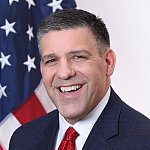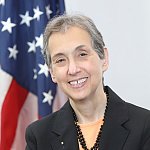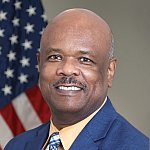You are here
NIH Leadership
The Office of the Director is the central office at NIH, responsible for setting policy for NIH and for planning, managing, and coordinating the programs and activities of all NIH components. The NIH Director, with a unique and critical perspective on the entire agency, is responsible for providing leadership to the Institutes and for constantly identifying needs and opportunities, especially for efforts that involve multiple Institutes. The NIH Director is assisted by NIH Deputy Directors including the Principal Deputy Director, who shares in the overall direction of the agency's activities.
The NIH Director

Jay Bhattacharya, M.D., Ph.D. is the 18th director of the National Institutes of Health. President Trump nominated Dr. Bhattacharya for the position on November 26, 2024, the U.S. Senate confirmed him on March 25, 2025, and he took office on April 1, 2025. A health economist and longtime NIH grantee, he previously served as a professor at Stanford University’s School of Medicine and Department of Economics. Read Dr. Bhattacharya’s bio sketch.
Deputy Directors
Chief of Staff
Associate Directors
Institute and Center Directors
Each NIH Institute and Center has its own director to lead the pursuit of the research mission specific to the Institute.
The Role of the NIH Director
The NIH Director plays an active role in shaping the agency's activities and outlook. With a unique and critical perspective on the whole of the NIH, the Director is responsible for providing leadership to the Institutes and for constantly identifying needs and opportunities, especially for efforts that involve multiple Institutes.
The Director stays in touch with each Institute's priorities and accomplishments through:
- regular senior staff meetings,
- discussions with scientific interest groups, and
- briefing sessions with Institute directors.
The Director also seeks advice from the Advisory Committee to the Director, Council of Councils, Scientific Management Review Board, and the Clinical Center Research Hospital Board. These are federal advisory committees comprised of members who are independent of NIH and have the required expertise to advise the NIH Director on major decisions on plans and policies affecting the NIH. The Director also receives advice through discussions with the Administration, usually through the Department of Health and Human Services (HHS), and with the Congress.
The NIH Director is responsible for advising the President on his annual budget request to Congress on the basis of extensive discussions with the Institute Directors.
The position of the NIH Director became presidentially appointed with the passage of the National Cancer Act of 1971 and Senate confirmed with the National Cancer Act Amendments of 1974. Prior to 1971, all NIH Directors were appointed by the Surgeon General, with the exception of Robert Q. Marston, who was appointed by the Secretary of Health, Education, and Welfare.
Related Links
- All of Us Research Program Office — Leads a nationwide research effort to gather data from one million or more volunteers over time, with the ultimate goal of improving health through more precise preventive care and medical treatment.
- Data Science — An NIH-wide priority initiative to take better advantage of the exponential growth of biomedical research datasets, which is an area of critical importance to biomedical research. NIH will engage with partners both within NIH and in academia, industry, non-profits, or other government Agencies, to coordinate access to and analysis of many different data types (Big Data) that make up this revolution in biological information.
- Division of Program Coordination, Planning, and Strategic Initiatives — Identifies emerging scientific opportunities, rising public health challenges, and scientific knowledge gaps that merit further research. Plans and implements trans-NIH initiatives supported by the Common Fund and coordinates research related to AIDS, behavioral and social sciences, women's health, and disease prevention.
-
Environmental influences on Child Health Outcomes (ECHO) Program — Leads a nationwide initiative to answer crucial questions about the effects of a broad range of early environmental exposures on child health and development combining longitudinal data from new and existing clinical research studies. Includes more than 50,000 children from racially, ethnically, geographically and socioeconomically diverse backgrounds.
- Executive Office — The Executive Office leads the NIH Office of the Director (OD) in a wide array of administrative and business operations.
- Executive Secretariat — Manages the flow of information to and from, and the storage and retrieval of records
- Office of the Chief Information Officer — Provides IT Strategic Planning to NIH Leadership Offices and Institute and Center Directors and serves in a leadership role in IT governance at NIH. Responsible for coordinating NIH IT with other HHS Operating Divisions and with other Federal Agencies.
- Office of Communications and Public Liaison — Responsible for communicating information on NIH programs and activities to the public, the media, the scientific and medical communities, and public advocacy groups.
- The Office of Clinical Research — Develops clinical research training programs and collaborative funding opportunities, provides scientific review of all clinical protocols in the NIH intramural program, and facilitates partnerships between NIH and academic medical centers.
- NIH Ethics Office — Responsible for assisting NIH staff with the requirements, statutes, and regulations governing behavior of employees of the Federal Government.
- Office of Extramural Research — Provides the corporate framework for NIH research administration, ensuring scientific integrity, public accountability, and effective stewardship of the NIH extramural research portfolio.
- Office of Intramural Research — Responsible for oversight and coordination of intramural research, training, and technology transfer conducted within the laboratories and clinics of the National Institutes of Health (NIH).
- Office of Management — Responsible for NIH-wide administration and management.
- Office of Legislative Policy and Analysis — Serves as the principle legislative office for the NIH Director and other senior NIH staff.
- Office of the Ombudsman / Center for Cooperative Resolution — provides informal assistance to members of the NIH community in addressing lab and work-related issues.
- Office of Science Policy — Advises and supports the Director of the National Institutes of Health (NIH) on science policy issues affecting the medical research community, the NIH, and the public.
This page last reviewed on April 8, 2025




















